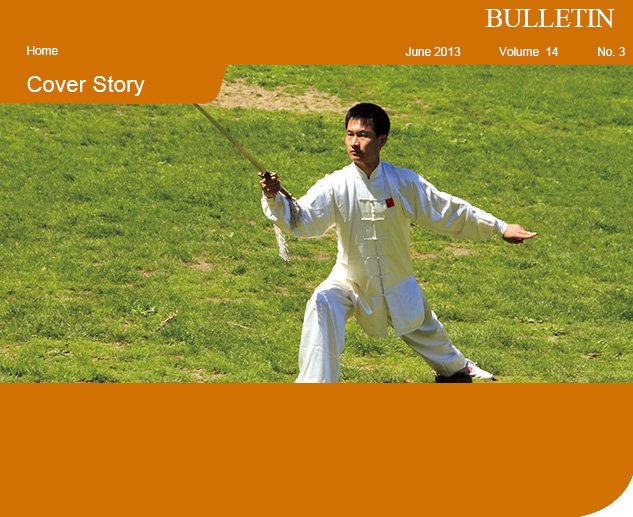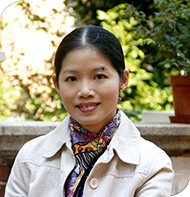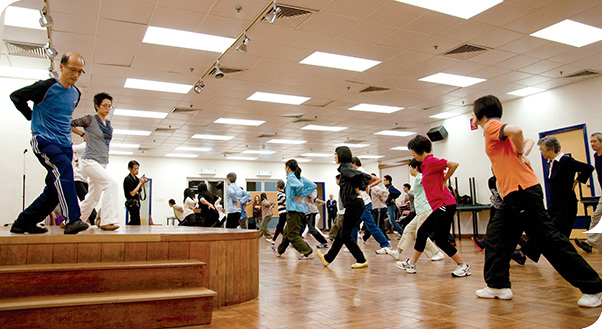| Qigong and Tai Chi
Tame Chronic Illnesses |
|
| The gentle mind-body exercises of qigong and tai chi have been given a new purpose in research by the Centre on Behavioural Health. On the one hand they are being used to calm the mind, on the other to energise it, in patients with chronic fatigue and schizophrenia. |

|
Qigong and tai chi have been practised for centuries to boost health and well-being. Now their potential is being harnessed to help relieve patients with symptoms of chronic diseases and try to improve their quality of life. Dr Rainbow Ho has been leading the research in the Centre on Behavioural Health, a fitting focus for the former competitive dancer and dance therapist, who is keen to get more people moving. “Hong Kong people are more familiar with qigong and tai chi compared with dance movement, so I thought they would be more willing to do these forms of exercise. Tai chi and qigong have also not been studied very much in a systematic and scientific way and I thought we could make a contribution towards understanding their benefits,” she said. Dr Ho has conducted separate studies involving qigong for sufferers of chronic fatigue syndromes and tai chi for schizophrenia patients, and in both cases found the programmes could help to reduce symptoms. Physical and mental improvements In the qigong study, 33 chronic fatigue patients performed qigong over four months and were compared to a control group that continued their lives as usual. Chronic fatigue is characterised by severe fatigue and is estimated to affect more than 10 per cent of the adult population, but Western treatments and medications have had limited benefits and even some undesirable side effects. The impact of qigong was measured in two ways: by a biomarker, telomerase, which is related to the ageing of cells, and by patients’ own feedback. In both cases the results were positive. Those in the qigong group were found to have higher levels of telomerase activity, a result that possibly reflected the mindfulness nature of the exercise which can help to reduce oxidative stress. Most importantly, the qigong participants reported feeling better with reduced physical and mental fatigue. “The findings showed both an objective physiological improvement and self-reported improvement by the patients. Many of them told us they slept better, felt happier, worked more efficiently and had more energy in the day. Chronic fatigue is very annoying and the important thing is that they can sleep better, thus they can function better,” Dr Ho said. Following this, another randomised controlled trial was conducted on another group of chronic fatigue patients that measured the stress hormone cortisol in addition to the telomerase activity and psychosocial parameters. The patients who practised qigong had a lower salivary cortisol level, higher telomerase activity and better subjective health-related quality of life after practising qigong. These improvements were not found in the control group. |
 |
“Many of them told us they slept better, felt happier, worked more efficiently and had more energy in the day.” |
||
| Dr Rainbow Ho |
|
Better functioning For the tai chi study, a pilot randomised controlled trial was undertaken on 30 schizophrenic patients in residential care. After six weeks of tai chi exercises, conducted under the supervision of their caregivers, they were found to have better movement coordination and also improved social skills, possibly because they were exercising in a group. “The buffering effect of tai chi on motor deterioration is important because movement coordination can help to sustain the patient’s self-care abilities and the completion of daily tasks,” Dr Ho said. “Tai chi also has a mindfulness component and we hypothesise that it might help to reduce episodes of schizophrenic symptoms and maybe make patients more calm and focussed. We want to study this aspect further.” Funding for that project has been received from the General Research Fund of Hong Kong’s Research Grants Council. A trial involving 150 schizophrenic patients will be conducted over the next two years and hopefully offer a new avenue for improving symptoms. Interest from abroad Dr Ho has also had research projects on qigong for cancer patients and their caregivers, which was found to have a positive effect on both groups, and on mindfulness training for medical students. Her work has attracted enquiries from abroad, where interest is picking up in traditional Chinese therapies as an alternative to standard Western medicines and therapies. “When the qigong paper was published online, I immediately received enquiries from Japan and the US for more details about the experiment. Some health-related overseas magazines also reported the findings. A lot of people are interested. So we are in a good place to be doing this kind of research at HKU,” she said. |
 Participants practise qiqong in the chronic fatigue intervention group, stretching of trunk and hip joints by stepping forward and backward. Participants practise qiqong in the chronic fatigue intervention group, stretching of trunk and hip joints by stepping forward and backward. |
| Back |